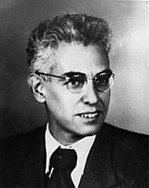How to Pronounce Alexander Luria
#50
Most Popular
Boost
Jul 03, 1902 Kazan, Republic of Tatarstan, Russia Died on 14 Aug 1977 (aged 75)
Soviet psychologist
CancerAlexander Luria, Date of Birth, Place of Birth, Family, Facts, Age, Net Worth, Biography and More in FamedBorn.com

Soviet psychologist
Cancer